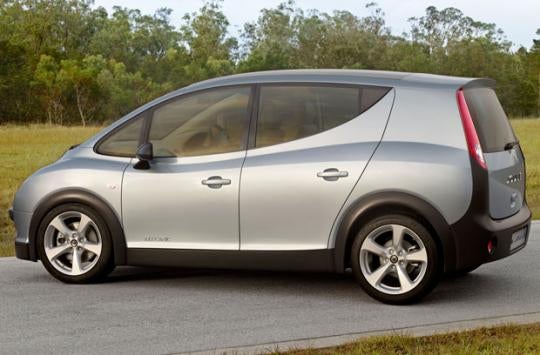South Africa's hopes rest on energy-conscious Joule

Among the battery-powered marvels that will be moving from the stands of automobile shows onto the forecourts of garages around the world this year is an unlikely newcomer. Car giants like Nissan with the “Leaf”, Chevy with its “Volt” and Renault with the “Fluence” will be joined by the unheralded Optimal Energy with the “Joule”.
The plucky outsider in what's expected to be a huge new opening in the car market, South Africa's offering will carry with it the burden of hope that sub-Saharan Africa's biggest economy can find a place amid the high-tech industries fuelling the drive for greener transport.
A defiantly sleek addition to a sometimes utilitarian sector it's more reminiscent of luxury car-maker's city runarounds like the A-class Mercedes than the boxy hybrids common to greener motoring. The latest incarnation of the Joule spends most of its days in a showroom on the outskirts of Cape Town .
With a top speed of 135 kilometers per hour and a range of 250 kilometres, it will cost about £21,000. And visible in its shape is the outline of an ambitious effort to place South Africa among the industrialized middle income countries like China , India and Brazil – delivering jobs for an economy where growth has so far failed to deal with the problem of mass unemployment.
As wage inflation in Asia pushes up the cost of manufacturing there analysts have been predicting a shift to Africa.
South Africa with its superior infrastructure and track record of excellence in engineering is the place everyone has been looking for signs that this shift has begun.
But for all the first world class roads, airports and sporting arenas showcased by the World Cup earlier this year, it remains one of the most unequal societies on earth with joblessness rates running at 25 percent, rising to 70 percent in many rural areas.
At first glance the troubled automotive industry might seem an old-world option for expanding the country's manufacturing base. With car makers elsewhere struggling to survive, the establishment of an entirely new brand is ambitious in the extreme, admits Optimal Energy CEO, Kobus Meiring .
“When everyone's running away that's the time to climb in,” he says. “This is the time for electric cars.”
A former mechanical engineer with no experience of designing or building cars, whose previous project was constructing one of the world's most high-powered telescopes, he's unburdened by the gloom that pervades much of the sector.
Optimal Energy expects to create an initial 10,000 jobs when its plant is up and running in 2013 but as the industry servicing the cars expands it hopes that electric cars can provide 160,000 South African jobs by 2020.
“ If any country in Africa was going to start a homegrown car maker it was going to be here,” he says.
The reasons for this are the same as those that led to the creation of the Cape Colony in the first place. South Africa sits at a vital stopping-off point in the world's trade routes.
It already has a car industry based in part on geography but one that only produces automobiles for foreign owned manufacturers like Volkswagen and BMW. Car plants employ tens of thousands of workers in the south coast's industrial cities like Port Elizabeth and East London and the province of Gauteng further north.
While comparatively few people driving German engineered cars in Europe know it, the vehicles they're driving have often been put together in South Africa .
“ The skilled labour we have in the car industry can compete with anywhere in the world,” he adds. “But all the principles sit overseas, so theoretically they can move away taking jobs with them.”
The answer will be a drive to keep the value in South Africa through the creation of OEMs – Original Equipment Manufacturers – like Optimal.
Meiring acknowledges that without government backing the project would have been a non starter. The state is the largest shareholder in the producers of the Joule, with a one-third stake.
The government is investing heavily in mining, engineering and aviation with the emphasis on job creation. “We are a producer and exporter,” Naledi Pandor, the minister of science and technology said recently. “Now we’re saying: let’s become an innovator.”
Beyond the financing the greatest challenge was attracting the expertise to design a car that would stand out in what is fast becoming a crowded scene – at a recent Geneva international auto show there were 30 electric cars on display.
This effort was helped by a chance meeting with another South African with an engineering background who was introduced to the project while househunting in Cape Town .
Subscribe to Independent Premium to bookmark this article
Want to bookmark your favourite articles and stories to read or reference later? Start your Independent Premium subscription today.

Join our commenting forum
Join thought-provoking conversations, follow other Independent readers and see their replies